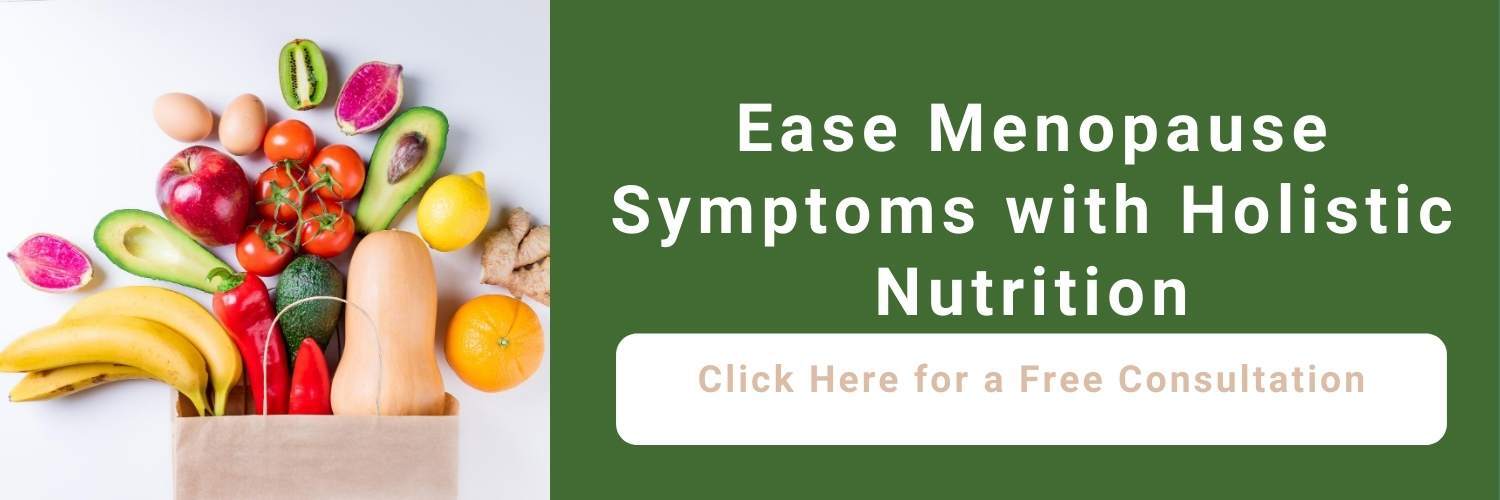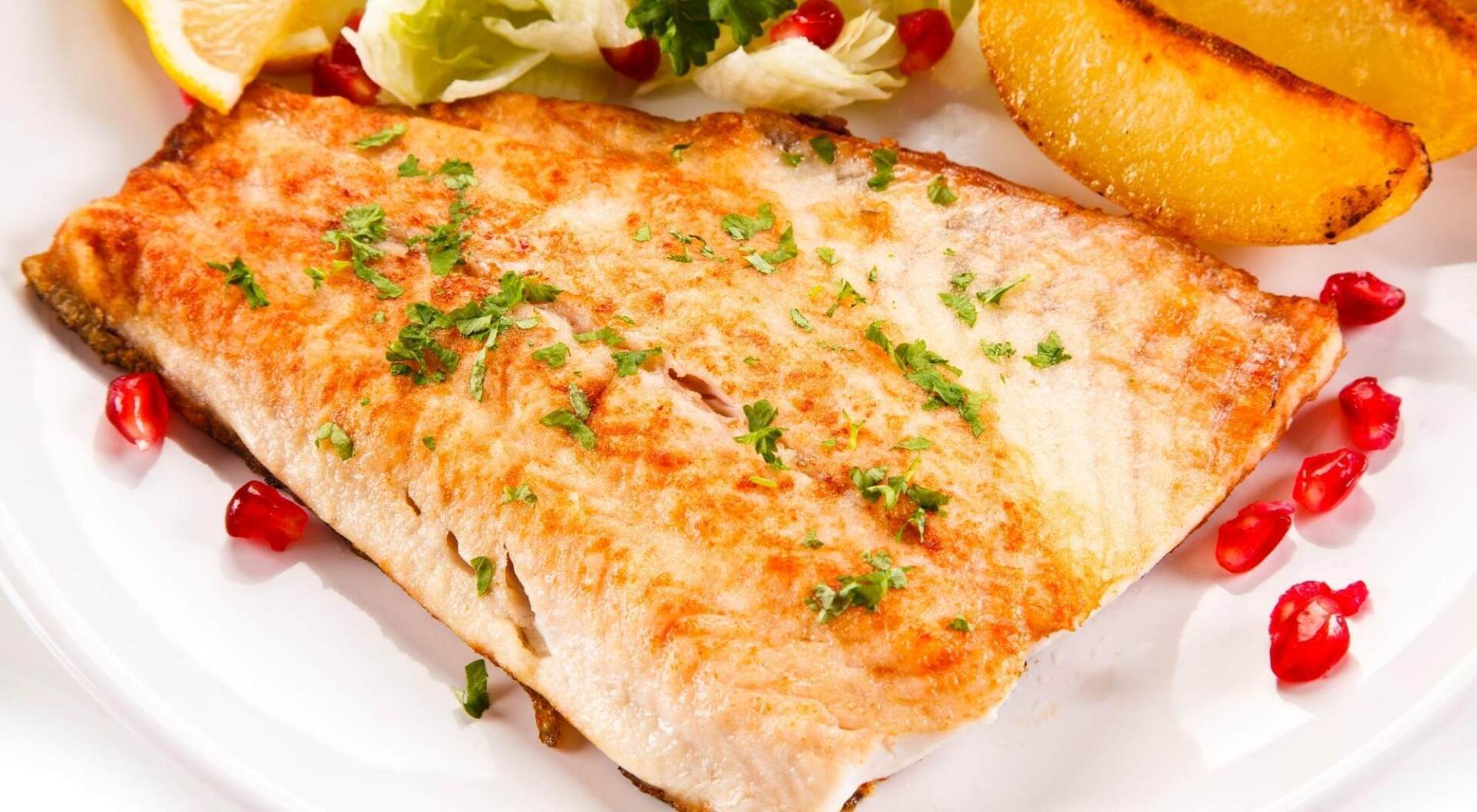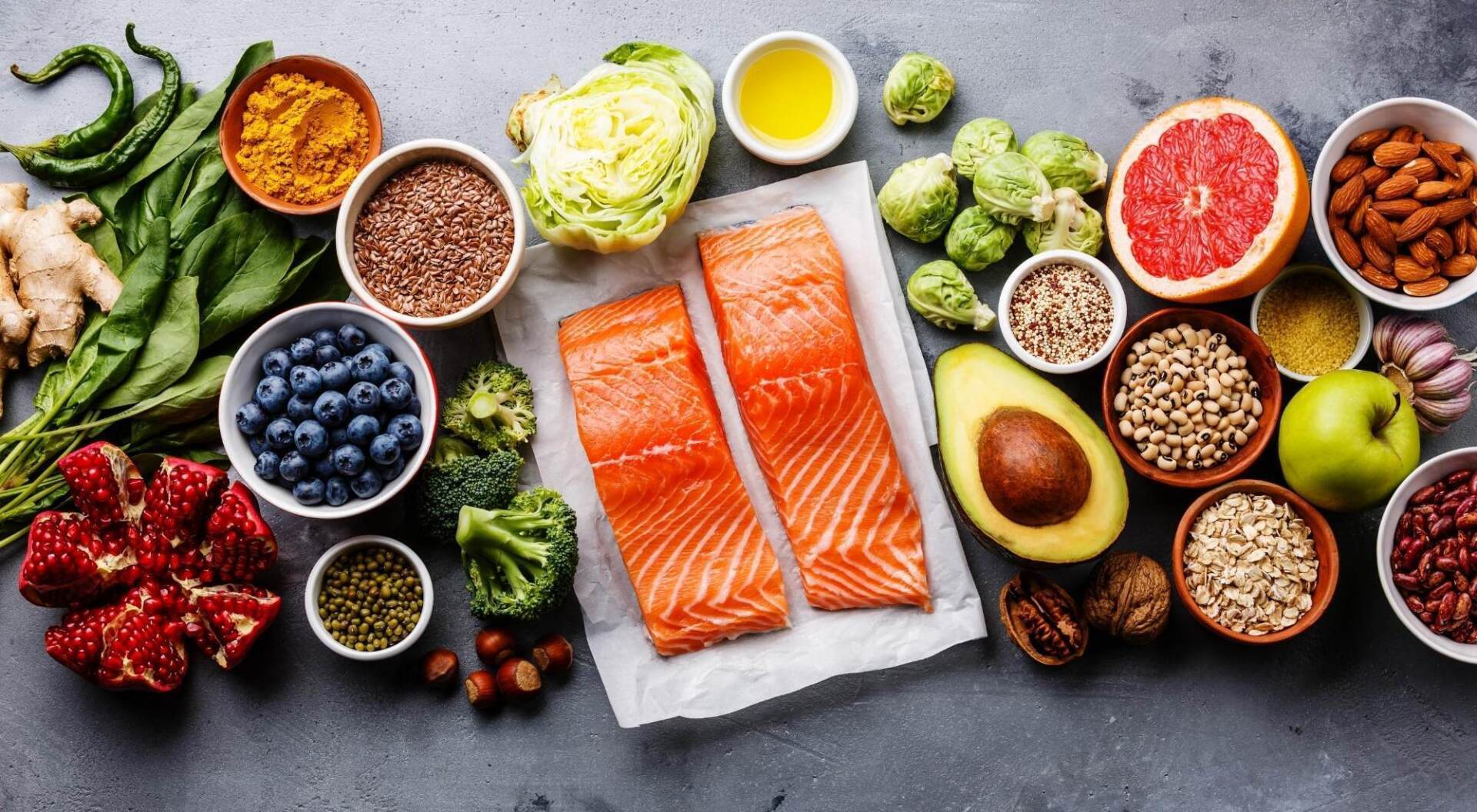Menopause Relief - Foods That Can Help With Menopause Symptoms
"The content below is not intended to be a substitute for professional medical advice, diagnosis, or treatment. Always seek the advice of your physician or other qualified health provider with any questions you may have regarding a medical condition."
Hot flashes, irritability, loss of sleep, weight gain — you’ve experienced them all and are desperate for some relief.
But not just any relief will do. You want natural relief.
Help and relief are indeed possible, naturally. Your body knows what it needs, and you can be empowered to minimize and alleviate the uncomfortable side effects of menopause.
Below, you’ll learn about:
- The stages of menopause
- Common menopause symptoms
- Foods good for menopause
- Foods to avoid during menopause
- The benefits of holistic nutrition
Table of Contents
- Menopause: A 3-Step Progression
- Step 1: Premenopause
- Step 2: Menopause
- Step 3: Postmenopause
- Foods For Menopause - Good Fats
- Fatty Foods To Help Menopause - Foods From The Sea
- Fatty Foods To Help Menopause - Nuts And Seeds
- Foods For Menopause - Increase Your Vitamin D
- Foods For Menopause - Healthy Gut
- How To Use Foods For A Healthy Gut
- Foods To Avoid During Menopause
- What Does A Holistic Nutritionist Do?
- How A Holistic Nutritionist Can Help You Find The Best Foods For Menopause
- How HealthierU Can Help You With Your Menopause Symptoms
Menopause: A 3-Step Progression
Menopause can be an uncomfortable and unfavorable subject for women.
- Young women may avoid it because it seems irrelevant to them.
- Women approaching menopause may not want to discuss it because they know it’s inevitable and simply hope to avoid it as long as possible.
- Women who’ve reached menopause may just be glad it’s over and want to erase the memory from their mind.
In any case, menopause is real, and the symptoms of menopause are real. Understanding menopause can help equip you to face it head-on and treat it with less stress and fear.
For most women, menopause is the natural part of aging signaled by the cessation of their menstrual cycle.
But for some women, this change is not natural at all.
Women may experience early or induced menopause for a variety of reasons including:
- Removal of the ovaries or uterus
- Cancer treatment
- Immune system disorders
In general, menopause occurs in women ages 40 through 58 and progresses in three phases.
Each phase is characterized by the age of onset and particular symptoms. Because each woman is an individual, these stages and symptoms will be unique for each woman.Step 1: Premenopause
Susan is forty-two and believes she has just entered premenopause, also known as perimenopause.
Some symptoms she’s experiencing include:
- Irregular periods
- Hot flashes
- Night sweats
Like many other women, what Susan is experiencing are the classic first signs of menopause.
These early symptoms can be disturbing and unsettling, especially if they come on suddenly, but educating yourself about the process of menopause can take away some of the anxiety.
Premenopause can last anywhere from four to eight years and usually starts years before menopause.
A woman who has experienced regular periods may be taken off guard when all of a sudden she starts missing periods for months at a time. Irregular periods during perimenopause happen when your ovaries slowly make less estrogen.
Perimenopause will last until menopause when menstrual periods cease altogether. During the last few years of this stage as estrogen levels fall at a quicker rate, perimenopause symptoms may be heightened.
Symptoms Of Premenopause
Three of the most common premenopause symptoms are hot flashes, night sweats, and vaginal drying.
Hot Flashes:
Hot flashes may be the most well-known and also the most bothersome perimenopause symptom.
Hot flashes are characterized by:
- A sudden feeling of heat that can spread throughout the body
- Reddening of the skin
- Profuse sweating
Hot flashes can occur many times a day, last one to five minutes, and are often followed by a cold chill.
Night Sweats:
Night sweats are hot flashes that occur at night. In addition to the discomfort of hot flashes, night sweats can interfere with sleep.
Many people associate irritability with menopause, but it’s likely that the lost sleep contributes heavily to heightened mood swings and irritability.
Vaginal Dryness:
Vaginal dryness, more technically known as vaginal atrophy, occurs when the vaginal tissues and lining begin to dry due to lower estrogen levels.
Step 2: Menopause
Rebecca is 51, and though she experiences other symptoms, she is glad she has finally passed from perimenopause to menopause.
Though women enter the second phase of menopause at different ages, Rebecca has entered the second stage at 51, the average age most women enter this phase.
Menopause is signaled by the absence of your period for at least 12 consecutive months. This happens because your ovaries have stopped releasing eggs and producing the majority of their estrogen.Symptoms Of Menopause
Like Rebecca, many women rejoice when they’ve finally passed that sacred and special 12-month stretch without a period.
Though that is certainly an exciting milestone, some troubling symptoms of menopause can persist.
Some of these uncomfortable symptoms include:
- Fatigue
- Depression
- Headaches
- Weight gain
- Changes in sex drive
Step 3: Postmenopause
Gladys is 60 and has already endured the unpleasant effects of perimenopause. Additionally, she was delighted when she reached menopause and marked off the 12th month on her calendar in which she did not have a period. She has now made it to the end of the menopause line — postmenopause.
Postmenopause refers to the time after that 12-month period-free stint — the rest of your life after menopause.
Since post means after, you might be tempted to plan a celebration. Though a celebration for reaching postmenopause would certainly be in order, some aggravating symptoms may still linger.Symptoms Of Postmenopause
Postmenopause will mean an easing of menopausal symptoms for most women.
Other women, however, may struggle with hot flashes and vaginal dryness for up to ten more years.
Even if your menopausal symptoms lessen or eventually disappear, women should be aware that other health risks are related to the loss of estrogen.
Some of these health risks include:
- Stroke
- Heart disease
- Osteoporosis
Foods For Menopause - Good Fats
When looking for help with menopause symptoms, nutrition is sometimes the last place people go. Therapies and medicines are often the first go-to for symptom relief, and unfortunately, even doctors forget the importance of good nutrition in healing the body.
In general, the American diet is highly deficient in good fats, so it’s no surprise that many women in the throes of menopause are also lacking in this integral nutrient.
How can good fats help women in the different stages of menopause?
A study by Leeds University in England suggests that the onset of perimenopause may be delayed due to a diet that includes fish.
Also, a diet rich in healthy fats may benefit women during menopause by:
- Decreasing the frequency of hot flashes
- Lessening the severity of night sweats
- Lowering the instances of depression
How do good fats bring about such benefits?
Fats are the building blocks of hormones, and you can only get them from your diet (or supplements). Simply put, you need good fats to enable your body to produce the hormones it needs.
Not only that, but fatty acids also aid in hormone:
- Transport
- Communication
- Site reception performance
Fatty Foods To Help Menopause - Foods From The Sea
Unless you were born a seafood lover, you are probably one of the many Americans who doesn’t eat much fish and therefore has a diet deficient in good omega fats.
If you’re willing to experiment a little and try some new foods, you’ll find that the following are healthy food choices for menopause:
- Tuna
- Salmon
- Sardines
- Anchovies
- Mackerel
Fatty Foods To Help Menopause - Nuts And Seeds
If seafood isn’t your thing, don’t fret — nuts and seeds were made just for you.
Other outstanding sources of healthy fats include:
- Coconuts
- Avocados
- Nuts
- Almonds, pecans, walnuts, pistachios, walnuts, macadamia nuts
- Seeds
- Flaxseeds, chia seeds, hemp seeds, sesame seeds
Of course, the kinds of seeds and amount of seeds a woman needs are based on her individual make-up. There’s no magic formula or set allowance that will fit every woman.
Let Dr. Sergi help meet your individual needs by getting a comprehensive and customized plan.
Click the link below to get started with a complimentary consultation.
Foods For Menopause - Increase Your Vitamin D
In addition to good fats, most Americans are also deficient in their vitamin D intake.
Stress can also be a major inhibitor of vitamin D function.
During the stages of menopause, the adrenals pick up the slack when estrogen levels decrease. These adrenals also produce stress hormones, and when stress is increased, your vitamin D levels plummet quickly.
Vitamin D (and C) are undoubtedly a few of the most important and beneficial vitamins for menopausal women.
Not many foods contain vitamin D, but it’s not called the “ sunshine vitamin ” for no reason. The sun is one of the most available sources of vitamin D, so simply spending some time outside can benefit you in more ways than one.
Other good food sources of vitamin D are:
- Mushrooms
- Fish
- Egg yolks and other dairy products
Foods For Menopause - Healthy Gut
Our gut contains more than 100 trillion bacteria that play a role in our body’s metabolism and immune system function. Good gut health is also important in fighting off diabetes, heart disease, and obesity.
Our guts carry both good and bad bacteria, and some of the bad bacteria need to be replaced with good bacteria for optimal gut health.
Gut health could possibly be the most overlooked health consideration in general. This is especially true with women going through menopause because good, healthy bacteria is essential for hormonal balance .How To Use Foods For a Healthy Gut
Estrogen breaks down in the gut, and the body either uses it or eliminates it. If the gut is not eliminating it efficiently, it can build up in the body and contribute to hot flashes, weight gain, inability to focus, and mood swings. Estrogen dominance can even be a contributor to breast cancer.
Focusing on good gut health is an important aspect of managing menopause symptoms.
Probiotics are an excellent choice to include in your diet to help menopause symptoms. Some other foods to aid in gut health include:
- Colorful vegetables like peppers, onions, squash, carrots (just to name a few)
- Fruits in moderation, focusing on red berries
- Fermented foods and drinks like kombucha, yogurt, sauerkraut, kimchi
Foods To Avoid During Menopause
Now that we’ve looked at foods to assist with menopause symptoms, it makes sense to think about what foods to avoid.
Limiting or avoiding the foods below will benefit all of us, especially those of us dealing with menopause:
- Processed food
- Gluten
- Soy
- Excessive red meat
- Pasta
- White or processed bread
- Refined sugar
- Artificial sweeteners
What Does A Holistic Nutritionist Do?
Our bodies are intricate mechanisms with many parts that work as a whole. A holistic nutritionist seeks to treat the whole person naturally.
“Your body knows what’s wrong with it,” Dr. Sergi asserts.
Our bodies can be healed and restored with the right nutrition and lifestyle guidance rather than resorting to medication and surgery.
Dr. Sergi’s approach is unique because she combines holistic nutrition, chiropractic care, and Nutrition Response Testing to offer optimal natural solutions for symptoms and pain.How A Holistic Nutritionist Can Help You Find The Best Foods For Menopause
In addition to helping patients know what foods to eat for menopause, a holistic nutritionist will provide other services aimed at pinpointing stresses and other causes of pain and symptoms.
Dr. Sergi utilizes an approach called Nutrition Response Testing that includes:
- Muscle testing
- Neurological reflexes
- Homeopathic dilutions
How HealthierU Can Help You With Your Menopause Symptoms
We are not robots and do not all respond to the same formula.
Instead, we are all unique individuals with varying abilities, needs, and conditions.
The plan or strategy that works for you and meets your needs may not be the one that addresses my specific issues and concerns.
We are individuals, and we need individual attention.
And that is what Dr. Sergi offers at HealthierU.
Her comprehensive knowledge of each of her clients fuels her personalized approach.
Armed with these tools she’s able to provide all of her patients with customized:
- Lifestyle guidance plans
- Nutrition plans
We need to take care of ourselves so we can take care of those entrusted to us.
Let Dr. Sergi help you get started on the path to becoming the healthiest you possible. Click the link below.






